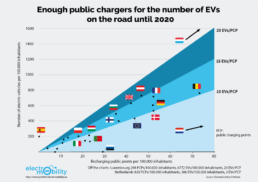Enough public chargers planned; infrastructure can’t be blamed for the slow uptake of EVs – analysis
More investment in public charging infrastructure needed after 2020 as electric vehicle sales increase.
Contrary to mainstream belief that there are not enough electric vehicle chargers and that this is discouraging potential EV buyers, a new analysis reveals sufficient public recharging facilities for the number of cars on the road in 2017 in many countries. Furthermore, if national EV infrastructure roll-out plans are met there will also be sufficient EV chargers until 2020.

The analysis by the Electromobility Platform [1] confirms that for passenger cars it is not the lack of infrastructure but rather the limited availability of electric vehicles that is responsible for low vehicles sales – 1.4% of new car sales in the EU in 2017. The Electromobility Platform is a partnership uniting organisations from across civil society, industries, and transport modes to promote the shift to all forms of electric transport.
The analysis found that on average there were five electric vehicles on the road per public charging point in 2017 in Europe, more than recommended by the European Commission [2]. However the European average ratio masks locations of over and under supply where further investment is needed.
If EU countries deliver on their plans for the roll-out of public charging infrastructure there will be around 10 EVs per charger by 2020, also in line with the Commission target. But further investment in public charging points (PCPs) will be required both before and after 2020 as electric vehicle sales increase.
Marie-France van der Valk, Head of the Brussels Renault-Nissan Alliance Office and Chairwoman of the Platform for Electro-mobility, said: “The European Member States are taking the right turn on electro-mobility and the EV market is starting to develop in an encouraging way. But full electro-mobility momentum can only be achieved together, with all of the EU members taking real initiatives for more infrastructure, green public procurement and actively supporting the shift to a low-carbon economy.”
The Platform analysis also shows that there will be at least one high power charging station every 40km on key European highways, a continental road network known as the TEN-T Comprehensive network, by 2020. This is more than the Commission’s recommendation of one charging station every 60 km. However, beyond 2020 increased numbers of charging points will be needed in some locations.
Electromobility not only helps drastically reduce climate-changing emissions from vehicles, but is also crucial to cut noise and air pollution levels in urban areas. Public authorities can provide a lead in supporting the shift to zero-emission transport and should be encouraged and supported to do so.
Nicolas Erb, Director of European Public Affairs for Alstom and Vice-Chair of the Platform, said: “By setting national targets for the public procurement of clean vehicles by 2025 and 2030, the directive currently being discussed in Parliament and Council is a major opportunity to boost zero-emission vehicle operations in European cities. Electric buses, taxis and delivery vehicles will help tackle the air pollution crisis in European cities and provide a market for clean European vehicles, strengthening the competitiveness of our industry.”
The Electromobility Platform will present the key findings of its new analysis today in a public event in the European Parliament at 5pm (Brussels time), in the presence of the Transport Commissioner Violeta Bulc.
Matthijs van Miltenburg MEP, host of the Platform event, said: “Europe needs to be a climate and technology leader. Electromobility helps achieve both strategic objectives. Europe should set a suite of ambitious policies to drive the economic and environmental benefits electromobility offers.”
Footnotes:
[1] The Platform for Electro-Mobility is an European alliance of 31 producers, infrastructure managers, operators, transport users, cities and civil society organisations from across industries and transport modes. The Platform advocates the acceleration of electrification of all modes of transport. The vision of the Platform for Electro-mobility is a sustainable, multimodal transport system in which people and goods are predominantly moved across land in Europe using sustainable electricity.
Current Members of the Platform: ABB, Alstom, Avere, Bellona, BlueSolutions, CER, CHAdeMO, Change Partnership, ChargePoint, European Cyclists Federation, ECOS, EIM, Enel, ENTSO-E, EURELECTRIC, Eurobat, European Copper Institute, London EV Company, Polis, RATP, Renault-Nissan, SmartEn, Siemens, SolarPower Europe, Tesla, 3M, Transport & Environment, UFE, UITP, Unife and Wind Europe.
[2] The European Commission recommends 10 EVs per public charging infrastructure, but this ratio will vary widely between locations and in particular whether private parking is available.
